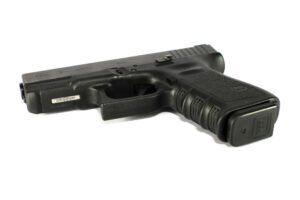

The law in most states is that, yes, it is a crime if you possess a defaced firearm. “Defacing a firearm” typically means that you or someone else either removed, altered, or destroyed the manufacturer’s serial number on the gun.
Possessing a defaced firearm is usually charged as a misdemeanor offense.
Note that the defacing of a firearm is a separate criminal offense from having a defaced weapon. This means if you remove the serial number on a firearm, and remain in possession of it, a prosecutor can charge you with two distinct crimes.
The criminal laws of most states say that you are guilty of possessing a defaced firearm if:
Most states say that a firearm has been defaced if someone has removed, altered, or destroyed the identification marks of a firearm. “Identification numbers or marks” may include the:
Note that you can be charged with this crime even if you were not the one who defaced the weapon. The focus is on whether you possessed the firearm after it was defaced.
In general, you “possess” a defaced weapon (or some other object) if you have:
You have actual possession of a firearm if you:
For example, you have actual possession of a handgun if you are carrying it in a backpack.
You have constructive possession of a weapon if you have control over the object, even though you may not have immediate access to it. 5
For example, you have constructive possession over something (like a machine gun) if you are storing it in a locked storage bin or a garage.
Please keep in mind that most states will have their own precise legal definition of possession. If you are charged with having a defaced firearm, it is wise to consult with a:
Depending on the facts of your case, a criminal defense lawyer might be able to cast reasonable doubt on whether you did in fact “possess” a firearm. Reasonable doubt could mean an acquittal in your criminal case.
Many states charge the crime of possessing a defaced firearm as a misdemeanor. However, some state laws do say that the crime can lead to a felony conviction. 6
Depending on the facts of your case, and the state in which you are convicted in, penalties for the crime can include:
Note as well that a conviction of this crime could result in the loss of your rights to own or posses a firearm.
For example, most jurisdictions say that it is a crime for a convicted felon to own, buy, or carry a gun. 7
Further, some states say that you will lose your gun rights for some misdemeanor crimes. For example, you could face the loss of your gun rights if you had a defaced firearm while in commission of a domestic violence charge. 8
Yes. Most states say that defacing a firearm is a separate and distinct offense than possessing a defaced firearm.
You are generally guilty of defacing a firearm if you alter, remove, or destroy the identification marks of a firearm.
The crime can usually be charged as either a misdemeanor or a felony depending on:
The reality is that law enforcement usually use the serial number of a firearm to help:
Often, the above identification and determination will assist in gathering evidence on who committed a crime.
Criminalizing the act of defacing a firearm, then, and the subsequent possession of a defaced weapon, helps deter the underlying act of defacement.
This deterrence helps promote: